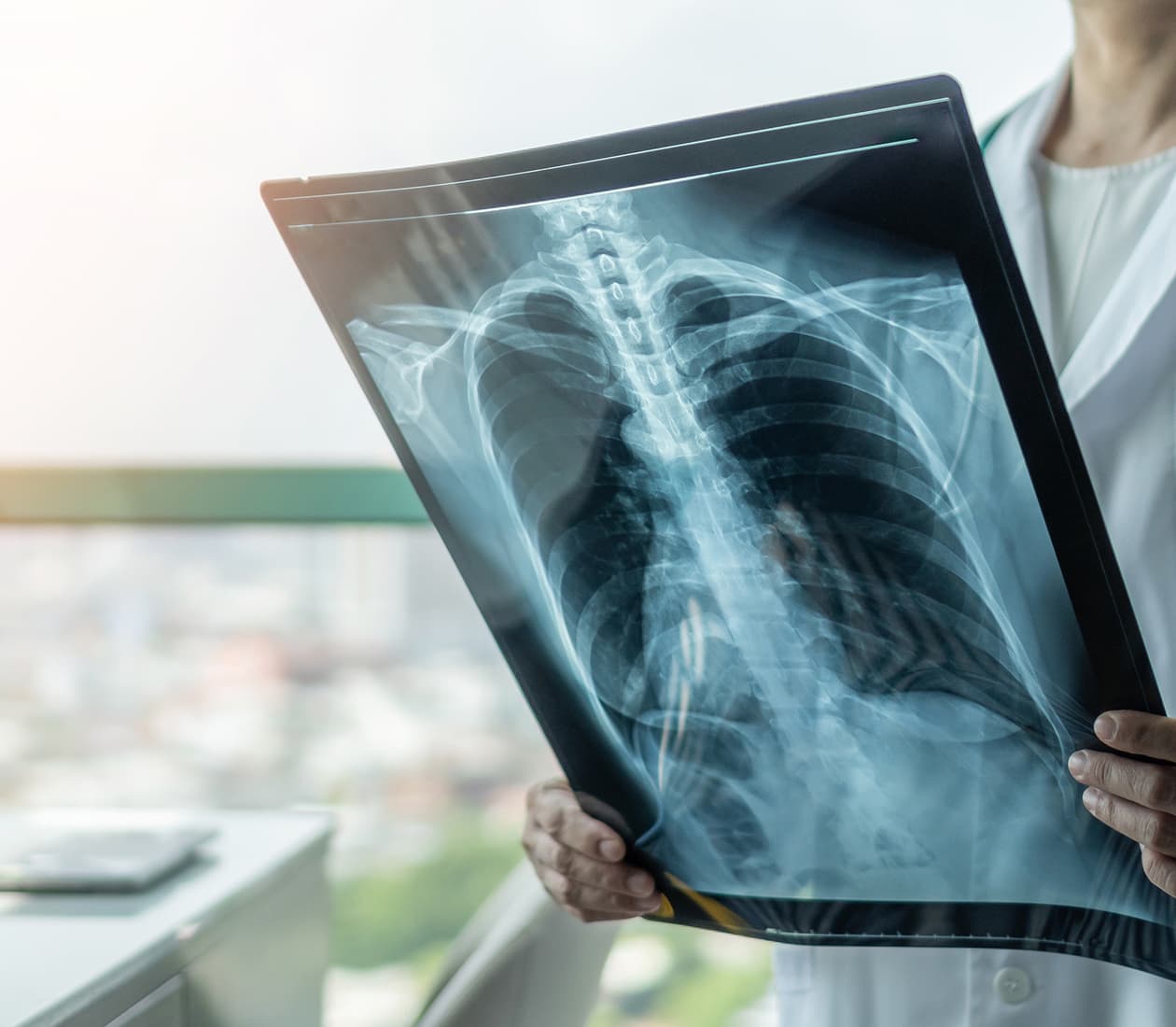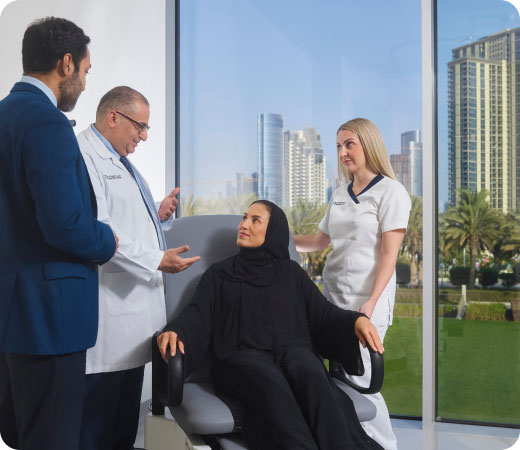
The multidisciplinary team at Cleveland Clinic Abu Dhabi’s Lung Cancer Program uses the latest available techniques to diagnose and treat lung cancer, close to home. The Program also offers screening for lung cancer in high-risk patients, particularly those with a history of tobacco use, to identify and treat cancers at the earliest possible stage, maximizing chances of recovery and survival. The Heart, Vascular & Thoracic and Integrated Hospital Care Institutes jointly contribute to this program.
Lung cancer symptoms may not be present when the disease is at an early stage, and some people have no symptoms at all. For others, lung cancer symptoms may include a cough, shortness of breath, chest pain and other respiratory symptoms.
Lung cancer is one of the most common, complex, and aggressive forms of cancer, but today the outlook for a person diagnosed with lung cancer is getting better, thanks to a greater understanding of the disease, new treatments, and less invasive surgeries, such as robotic surgery.

Our Lung Cancer Program brings together a multidisciplinary team, led by surgical oncologists, thoracic surgeons and pulmonologists, who collaborate with a diverse range of specialists including medical and radiation oncologists, specialized radiologists and pathologists, genetic counselor and dedicated nursing and support staff such as dieticians and physiotherapists. Together, these specialists collaborate to provide customized, coordinated care, ensuring the entire team’s expertise is focused on every patient. This comprehensive range of services ensures the highest quality of care is delivered, always.
Our team works together and meets regularly as a Tumor Board to explore and discuss the most appropriate approach to diagnosis and treatment for every patient, with treatment customized to ensure they enjoy the best possible quality of life. We also work closely with Cleveland Clinic in the US to discuss patient cases, when necessary, home to some of the most respected lung cancer specialists in the US.
We also offer an unparalleled range of embedded services to ensure an integrated, holistic and novel approach to care that goes beyond treating cancer and encompasses every aspect of our patients’ health and wellbeing. Our Lifestyle Medicine Program focuses on lifestyle choices and behaviors and their impact on the prevention, management and treatment of diseases like lung cancer, and our Palliative and Supportive Care Program focusing on improving quality of life for cancer patients and their families.

Lung cancer is the second leading cause of cancer death in the UAE, and the world’s most common cause of cancer-related death for both men and women. It is one of the most complex and aggressive cancers to treat. Lung cancer develops when the normal process of cell growth is disrupted or becomes abnormal, and a tumor forms.
Click here to learn more about lung cancer.
The incidence of lung cancer is strongly linked to cigarette smoking, with about 90% of lung cancers being linked to tobacco use. In the GCC and UAE, this also includes other forms of smoking, such as shisha, cigars, and medwakh pipes.
Most lung cancers begin in the bronchi lining (the airways of lungs or breathing tube). Lung cancer can also form in the glands below this lining, and frequently in the outer areas of the lungs.
There are two main types of lung cancer; small cell lung cancer or non-small cell lung cancer, which both develop in different ways:
Non-small Cell Lung Cancer (NSCLC)
NSCLC is the most common form of lung cancer. It often spreads and grows slowly and has three main types (named after the cells within which the cancer develops):
Small Cell Lung Cancer (SCLC)
SCLC is less common than NSCLC, accounting for only around 15% of lung cancers. However, this type of lung cancer grows quickly, and is often advanced and has spread at the time of diagnosis.
Click here to learn more about the different types of lung cancer.

Most commonly, doctors suspect somebody might have lung cancer when they see something on an imaging test such as an X-ray or CT scan that looks like a tumor. These tests are usually done for another medical reason and are what medical professionals call incidental findings. This happens because lung cancer symptoms may not be present when the disease is at its earliest stages. For some people, it can take many months or years to see any symptoms, and sometimes, people don’t have any lung cancer symptoms at all. However, for other’s symptoms may present very early on and should be taken seriously.
Signs and symptoms of lung cancer might include:
As well as smoking, other factors may increase your risk of developing lung cancer. Some can be controlled, like quitting smoking, and others can’t, such as your family history. Risk factors include:

Lung cancer often presents with subtle symptoms in its early stages, making early detection vital for successful treatment. Innovations such as low dose computed tomography (LDCT) scans have revolutionized the early detection process, enabling physicians to identify lung cancer at its earliest and most treatable stages. These non-invasive screening techniques have proven highly effective in high-risk individuals, leading to better outcomes and increased survival rates.
How lung cancer is diagnosed is different from person to person. Imaging tests, supported by several minimally invasive procedures, may be required if the imaging results reveal a possible cancer. If a patient requires multiple diagnostic tests (tests used to help diagnose a disease or condition), these can be performed in one setting in Cleveland Clinic Abu Dhabi’s hybrid operating rooms, reducing the need for multiple procedures and multiple patient transfers within the facility.
Diagnostic tests include:
Imaging Tests
Procedures
These important tests and procedures can help determine whether cancer is present, help tell how advanced the disease is and provide information that will help our specialized team to identify and treat lung cancers at the earliest possible stage, maximizing chances of recovery and survival.
Staging lung cancer is the next step in the lung diagnosis process and allows doctors to understand the extent of the cancer to make the best decisions for treatment. Learn more on the stages of lung cancer here.
Lung cancer treatment decisions are made by the patient and your specialized Thoracic Cancer team together. At Cleveland Clinic Abu Dhabi our multidisciplinary tumor board will meet to discuss each Lung Cancer patient. This team of specialists will sit together to talk through the best treatment options, including clinical trials, for each individual. This approach ensures each patient gets the benefit of several expert opinions for their treatment plan.
Treatment options for Lung Cancer are usually based on the types of cancer you have, the stage of the cancer and your lung cancer treatment goals. Treatment options usually involve:
Surgery
Surgery is usually required for the removal of cancerous tumors in the lung/s. Where possible, treatment is performed using minimally invasive techniques which mean smaller incisions, less pain, shorter hospitals stays, and faster recovery times compared to traditional open surgery. Technologically advanced minimally invasive options include:
The type of surgery performed can vary depending on the size, localization, and extent of the cancer. Some additional surgical treatment options include:
All the above surgeries can be performed by Cleveland Clinic Abu Dhabi’s experienced team of Lung Cancer surgeons. Additional treatment options also include:

Lung cancer is a complex and aggressive cancer to treat. It often has no symptoms until it is at an advanced stage, when survival rates are lower. But if caught early, lung cancer has a much higher chance of being cured. The best way to detect it early is through a routine screening.
Cleveland Clinic Abu Dhabi’s multidisciplinary and collaborative approach to Lung Cancer offers screening to anyone at an increased risk for the disease. Screening is performed with a low-dose CT scan of the lungs, which is fast, painless, non-invasive, and accurate. Click here to learn more.
Who Should Attend Lung Cancer Screening?
Anyone considered high-risk for lung cancer should attend regular screening. This includes:
Lung cancer screening saves lives. If you are at risk, book yours today.

The Thoracic Cancer Program at Cleveland Clinic Abu Dhabi that treats Lung Cancer is comprised of a multidisciplinary team and offers specialized support in areas ranging from diagnostic imaging and procedures to post-operative care. Caregivers include:

Speak with our Contact Center for assistance
Request an Appointment 800 8 2223 International Patients